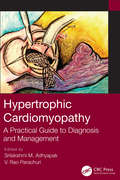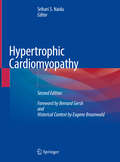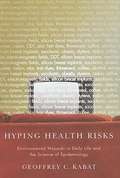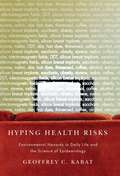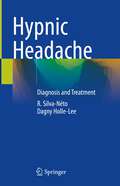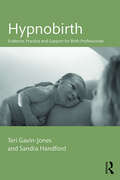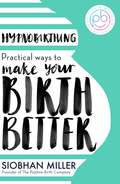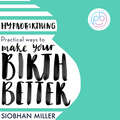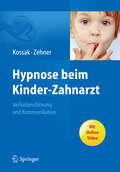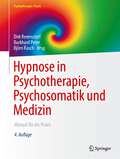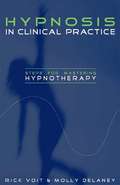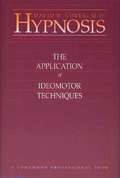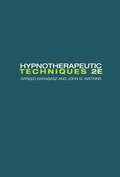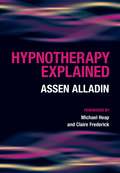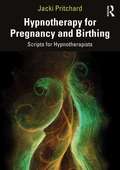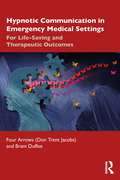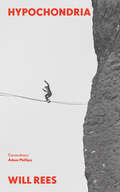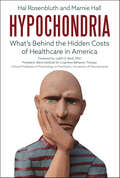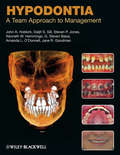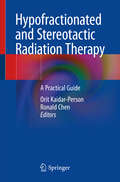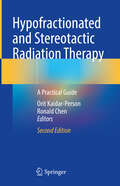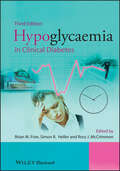- Table View
- List View
Hypertrophic Cardiomyopathy: A Practical Guide to Diagnosis and Management
by Srilakshmi M. Adhyapak V. Rao ParachuriHypertrophic cardiomyopathy is a disease of the cardiac muscle leading to severe debilitating symptoms with relentless progression. Medical options in treating this disease are limited to its early stages, with the disease often becoming resistant to pharmacological interventions. Hypertrophic Cardiomyopathy: A Practical Guide to Diagnosis and Management describes the various sub-types of this condition, including its unique anatomic features, with an emphasis on a therapeutic approach, encapsulating several techniques. Surgical myectomy has become the gold standard of effective treatment. This book also throws light on patient selection, newer surgical techniques, and novel image-based pre-operative planning modalities for surgical myectomy. Key Features Explores the surgical aspects along with the clinical coverage of hypertrophic cardiomyopathy Provides ready resource for practicing cardiologists, practitioners, trainees, and fellows Covers anatomical variants, mitral valve pathology, and non-invasive pre-surgical planning with a detailed surgical video and intra-operative pictures
Hypertrophic Cardiomyopathy: Foreword By Bernard Gersh And Historical Context By Eugene Braunwald
by Srihari S. NaiduThis extensively updated edition provides a comprehensive review of hypertrophic cardiomyopathy, the most common genetic disorder of the heart characterized by dysfunctional contractility at the sarcomere level. The disease produces abnormal and oftentimes focal hypertrophy on a macroscopic level that further impairs cardiac performance and may lead to life-threatening arrhythmias. This edition provides a practical approach, establishing evidence-based best practice for all scenarios.Hypertrophic Cardiomyopathy provides readers with key points and critical clinical pearls to assist them in managing patients. New chapters have been included on managing hypertension, sleep apnea, coronary artery disease, structural and congenital disease, nutrition and pharmacotherapies. All aspects of treatment are covered – medications, pacemakers and defibrillators, and invasive septal reduction therapy (both surgical myectomy and alcohol septal ablation) – in addition to genetics, family screening, lifestyle concerns, and athletic screening. The practical approach has been reinforced with an expanded emphasis on creating a Center of Excellence, how to facilitate the multi-disciplinary approach, and on case-based reviews and discussions, with each chapter ending with a post-test.This book is an essential text for cardiology professionals from trainee to board-certified physician, and includes important information for interventional cardiologists, cardiac surgeons, cardiac imagers, critical care physicians, sports medicine physicians, genetic counsellors, and electrophysiologists.
Hyping Health Risks: Environmental Hazards in Daily Life and the Science of Epidemiology
by Geoffrey C. KabatAccording to author and epidemiologist Geoffrey C. Kabat, this hyping of low-level environmental hazards leads to needless anxiety and confusion on the part of the public as to which exposures have important effects on health.
Hyping Health Risks: Environmental Hazards in Daily Life and the Science of Epidemiology
by Geoffrey KabatThe media constantly bombard us with news of health hazards lurking in our everyday lives, but many of these hazards turn out to have been greatly overblown. According to author and epidemiologist Geoffrey C. Kabat, this hyping of low-level environmental hazards leads to needless anxiety and confusion on the part of the public concerning which exposures have important effects on health and which are likely to have minimal or no effect. Kabat approaches health scares as "social facts" and shows that a variety of factors can contribute to the inflating of a hazard. These include skewed reporting by the media, but also, surprisingly, the actions of researchers who may emphasize certain findings while ignoring others; regulatory and health agencies eager to show their responsiveness to the health concerns of the public; and politicians and advocates with a stake in a particular outcome. By means of four case studies, Kabat demonstrates how a powerful confluence of interests can lead to overstating or distorting the scientific evidence. He considers the health risks of pollutants such as DDT as a cause of breast cancer, electromagnetic fields from power lines, radon within residences, and secondhand tobacco smoke. Tracing the trajectory of each of these hazards from its initial emergence to the present, Kabat shows how publication of more rigorous studies and critical assessments ultimately help put hazards in perspective.
Hypnic Headache: Diagnosis and Treatment
by R. Silva-Néto Dagny Holle-LeeHypnic headache is a rare primary headache that occurs only during sleep with a prevalence of 0.07%. Diagnosis are challenging since patients do not show changes in neurological examinations or exams. This book covers essential topics on clinical aspects of hypnic headache, complemented by differential diagnosis, pathophysiology and treatment. It is based on all reports and case series on hypnic headache that have been described to date, totaling 348 cases. It also brings up-to-date information besides to the diagnostic criteria described in the International Classification of Headache Disorders (ICHD-3). Written by authors with decades of experience, it’s divided into eleven chapters presenting the Historical aspects, Headaches classification, Epidemiology, Clinical characteristics in adults and children, Pathophysiology, Differential diagnosis, and Treatment. Hypnic Headache - Diagnosis and Treatment will be important not only for headache specialists, neurologists, but also for students and clinical physicians.
Hypno-Skripte: Lebensverändernde Methoden durch Selbsthypnose und Meditation
by Mary DealEntfessle die Kraft deines Geistes und entdecke dein Potenzial! Wünschst du dir, du hättest die Macht, alles zu werden, was du sein kannst? Jede gut gemeinte Programmierung funktioniert am besten, wenn du tiefere Ebenen des Bewusstseins erreichst. Das Geheimnis besteht darin, diese Ebenen durch einfache, lebensverändernde Techniken zu erschließen. Ein dünner Hauch des Bewusstseins unterscheidet zwei Geisteszustände: Selbsthypnose und Meditation. Dieses Buch erklärt ihre Ähnlichkeiten und beschreibt ihre jeweiligen Verhältnisse und deren Zugänglichkeit. Bist du neugierig genug, in dieses Buch zu blättern, so ist die Fähigkeit, diese Methoden zu lernen, bereits ein Teil deines Bewusstseins, der sich bald erkennen lassen wird. Glücklicher Mensch! Dein Unterbewusstsein fordert dich zur Forschung auf. Es sagt, dass du tiefere Geisteszustände erreichen kannst. Viele haben schon versucht, Selbsthypnose oder Meditation zu lernen, sind aber gescheitert. Eine geleitete, angewandte Konzentration oder das Wissen, was zu erwarten war, wenn sie einmal in Trance sind, haben möglicherweise gefehlt. Dieses Buch ist für diejenigen gedacht, die die Techniken der Selbsthypnose und/oder der Meditation zur Selbstverbesserung erlernen und anwenden möchten. Einfache, doch leistungsstarke Skripte werden angeboten, mit denen in beiden Techniken gearbeitet werden kann, um erwünschte Veränderungen zu bewirken. Du kannst dein Leben heute verändern!
Hypnobirth: Evidence, practice and support for birth professionals
by Teri Gavin-Jones Sandra HandfordMaternity services and choices for labour and birth are fast evolving. Hypnobirth involves preparation for childbirth using tried and tested hypnotherapy techniques in harmony with midwifery best practices and increasing numbers of women are turning to the technique. Written by two experienced practitioners, this is the first evidence-based practice book for medical professionals on this subject. Chapters include coverage of: What hypnosis is and the history of hypnobirth The power of the mind and the effect of language Relaxation and breathing techniques The neocortex and hormones Birth partners, relationships, women’s advocates and primary supporters Throughout the book the authors provide health professionals working in clinical midwifery practice with information and evidence-based findings to support the use of hypnobirth. The book includes case studies, scripts and reflective questions to encourage a deeper understanding of the techniques and issues and to engage and inspire the reader. Hypnobirth is essential reading for midwives, obstetricians, student midwives, doulas and any practitioner involved in preparing and supporting pregnant women for labour.
Hypnobirthing: Practical Ways to Make Your Birth Better
by Siobhan MillerTHIS BOOK WILL MAKE YOUR BIRTH BETTER. IT IS FOR EVERY WOMAN AND EVERY TYPE OF BIRTH. 'Siobhan manages to completely demystify hypnobirthing, making it accessible and relevant to all women and all births. This book will be a complete game changer and I will be recommending it to mums-to-be from now on' Sarah Turner, author of The Unmumsy MumExpert hypnobirthing teacher and founder of The Positive Birth Company Siobhan Miller has made it her mission to change the way women around the world approach and experience birth. Through her teaching she seeks to educate and empower women - and their birth partners - so that they can enjoy amazing and positive birth experiences, however they choose to bring their babies into the world.In this book, Siobhan debunks common myths about hypnobirthing and explains why she believes it can make every type of birth a better experience - from a water birth at home to an unplanned caesarean in theatre.So, what is hypnobirthing? Essentially, it's a form of antenatal education, an approach to birth that is both evidence-based and logical. Hypnobirthing certainly doesn't involve being hypnotised; instead, it teaches you how your body works on a muscular and hormonal level when in labour and how you can use various relaxation techniques to ensure you are working with your body (rather than against it), making birth more efficient and comfortable.Siobhan's advice and guidance will change your mindset and enable you to navigate your birth with practical tools that ensure you feel calm and in control throughout.By the time you finish this book you'll feel relaxed, capable and genuinely excited about giving birth.
Hypnobirthing: Practical Ways to Make Your Birth Better
by Siobhan MillerTHIS BOOK WILL MAKE YOUR BIRTH BETTER. IT IS FOR EVERY WOMAN AND EVERY TYPE OF BIRTH.AS FEATURED ON DRAGONS' DEN. 'Siobhan manages to completely demystify hypnobirthing, making it accessible and relevant to all women and all births. This book will be a complete game changer and I will be recommending it to mums-to-be from now on' Sarah Turner, author of The Unmumsy MumExpert hypnobirthing teacher and founder of The Positive Birth Company Siobhan Miller has made it her mission to change the way women around the world approach and experience birth. Through her teaching she seeks to educate and empower women - and their birth partners - so that they can enjoy amazing and positive birth experiences, however they choose to bring their babies into the world.In this book, Siobhan debunks common myths about hypnobirthing and explains why she believes it can make every type of birth a better experience - from a water birth at home to an unplanned caesarean in theatre.So, what is hypnobirthing? Essentially, it's a form of antenatal education, an approach to birth that is both evidence-based and logical. Hypnobirthing certainly doesn't involve being hypnotised; instead, it teaches you how your body works on a muscular and hormonal level when in labour and how you can use various relaxation techniques to ensure you are working with your body (rather than against it), making birth more efficient and comfortable.Siobhan's advice and guidance will change your mindset and enable you to navigate your birth with practical tools that ensure you feel calm and in control throughout.By the time you finish this book you'll feel relaxed, capable and genuinely excited about giving birth.
Hypnobirthing: Practical Ways to Make Your Birth Better
by Siobhan MillerTHIS BOOK WILL MAKE YOUR BIRTH BETTER. IT IS FOR EVERY WOMAN AND EVERY TYPE OF BIRTH.AS FEATURED ON DRAGONS' DEN. 'Siobhan manages to completely demystify hypnobirthing, making it accessible and relevant to all women and all births. This book will be a complete game changer and I will be recommending it to mums-to-be from now on' Sarah Turner, author of The Unmumsy MumExpert hypnobirthing teacher and founder of The Positive Birth Company Siobhan Miller has made it her mission to change the way women around the world approach and experience birth. Through her teaching she seeks to educate and empower women - and their birth partners - so that they can enjoy amazing and positive birth experiences, however they choose to bring their babies into the world.In this book, Siobhan debunks common myths about hypnobirthing and explains why she believes it can make every type of birth a better experience - from a water birth at home to an unplanned caesarean in theatre.So, what is hypnobirthing? Essentially, it's a form of antenatal education, an approach to birth that is both evidence-based and logical. Hypnobirthing certainly doesn't involve being hypnotised; instead, it teaches you how your body works on a muscular and hormonal level when in labour and how you can use various relaxation techniques to ensure you are working with your body (rather than against it), making birth more efficient and comfortable.Siobhan's advice and guidance will change your mindset and enable you to navigate your birth with practical tools that ensure you feel calm and in control throughout.By the time you finish this book you'll feel relaxed, capable and genuinely excited about giving birth.
Hypnose beim Kinder-Zahnarzt
by Hans-Christian Kossak Gisela ZehnerSchluss mit Zahnarztphobie bei Kindern Kinder sind beim Zahnarztbesuch oft unkooperativ und stellen in der Alltagspraxis eine hohe Herausforderung für das Praxisteam dar. Der damit verbundene Stress und die Angst der Kinder vor unangenehmen Erlebnissen werden mit der Anwendung von Kinderhypnose signifikant reduziert. Experten für Experten Die beiden Autoren sind bekannte Experten für Kinderhypnose und bringen ihre Erfahrungen als Kinderzahnärztin und Kinder- und Jugendlichenpsychotherapeut ein. Sie vermitteln wissenschaftlich fundierte Behandlungs- und Kommunikationsmethoden der Kinderhypnose, mit der hierzu speziell entwickelten Quick-Time-Trance und Kombinationen mit anderen Methoden (Akupressur, energetische Psychologie). Die Verhaltensführung und Behandlung beim Zahnarzt wird dadurch tatsächlich kinderleicht, da die Kinderhypnose auch dauerhafte positive Einstellungen zum Zahnarztbesuch vermittelt. Geschrieben für Zahnärzte, Kinderzahnärzte, Psychologen, Kinder- und Jugendlichenpsychotherapeuten, zahnärztliche Mitarbeiterinnen. Mit Online-Videobeispielen: zahlreiche Falldemonstrationen und Erklärungen zu den Methoden
Hypnose in Psychotherapie, Psychosomatik und Medizin: Manual für die Praxis (Psychotherapie: Praxis)
by Dirk Revenstorf Burkhard Peter Björn RaschDas Buch hat sich inzwischen zu einem Standardwerk der modernen Hypnotherapie in allen Anwendungsfeldern entwickelt. Ärzte und Psychotherapeuten erhalten praktische Anleitungen für die hypnotherapeutische Behandlung einzelner Störungen und werden mit den theoretischen Grundlagen vertraut gemacht. Zugleich ist es ein Ausbildungsmanual für klinische und medizinische Hypnose und ist daher für Ausbildungskandidaten und für Praktiker geeignet. Für die Neuauflage wurden alle Kapitel grundlegend aktualisiert und überarbeitet. Aus dem Inhalt: Allgemeine Prinzipien – Induktionen – Allgemeine Methoden – Verhaltensstörungen, Neurosen, Psychosen, Persönlichkeitsstörungen – Schmerz – Psychosomatik – Hypnose bei Kindern und Jugendlichen. Die Herausgeber: Professor Dr. Dirk Revenstorf, Universität Tübingen. Dipl.-Psych. Dr. Burkhard Peter, MEG-Stiftung München. Professor Dr. rer. nat. Björn Rasch, Universität Freiburg/Schweiz.
Hypnosis in Clinical Practice: Steps for Mastering Hypnotherapy
by Molly Delaney Rick VoitThis book is aimed at helping both newly trained and experienced mental health professionals become comfortable and adept in using hypnosis in their clinical practice. Despite dramatic evidence of the effectiveness of hypnosis and its growing acceptance, only a small percentage of psychotherapists employ their hypnotherapy training in their practices. This under-use of hypnosis is due to exaggerated misconceptions about its power and the resultant performance anxiety therapists experience after their training. This text is designed to address therapist performance anxiety surrounding the use of hypnosis by exploring the myths surrounding its power and therapeutic potential. The integration of a straightforward systematic hypnotic approach into therapeutic practice has value both in assessment and treatment. Using clinical anecdotes and personal experience, the authors of Hypnosis in Clinical Practice explain induction style and trance work in a way that is fundamental and highly accessible.
Hypnosis: The Application of Ideomotor Techniques
by David B. CheekPioneering physician, David Cheek, writes how he uses hypnosis in his medical practice. If you want to learn how the mind can overcome physical problems this book is a great demonstration. Written for those who wish to practice hypnotherapy, this book provides excellent training and insightful information on how to use hypnosis to overcome medical problems. This is an exceptional book written by an exceptional physician.
Hypnotherapeutic Techniques: Second Edition
by John G. Watkins Arreed BarabaszTwo premier hypnotherapists collaborate on a new edition of this award-winning text, a collection of techniques and information about hypnosis that no serious student or practitioner should be without. A thorough and practical handbook of various hypnotherapeutic measures, it contains illustrative examples and logically argued selection methods to help practitioners choose the ideal method for a needed purpose. Section by section, it breaks out the various methods and phenomena of hypnosis into easily digested chunks, so the reader can pick and choose at leisure. An excellent practical guide and reference that is sure to be used regularly. The authors have a wide and longstanding experience on the subject and thus can stay on clinically approvable methods.
Hypnotherapy
by Dave ElmanClassic work by a professional hypnotist who, for many years, taught physicians and other professionals the use of hypnosis.
Hypnotherapy Explained
by Assen Alladin Glenn RobertHypnotherapy provides a powerful tool for utilizing the power of the mind to reduce distress and suffering. This concise guide provides readers with a rich source of ideas on starting hypnotherapy practice, and thinking seriously about hypnosis as a powerful adjunct to psychotherapy and medical interventions. With a clear definition of what hypnosis really is, readers can develop an understanding of the rationale for utilising hypnotherapy with particular disorders.As the medical community is progressively adopting a biopsychosocial model of healing, there is a serious move toward validating the scientific credibility of hypnosis, and hypnotherapy has become a well-established treatment. Unlike any other introductory text, "Hypnotherapy Explained" adopts a uniquely scientific approach among introductory texts; reviewing theories and offering practical ways to integrate hypnotherapy in medical, psychiatric and psychotherapeutic practice. It is enlightening reading for general practitioners, psychiatrists, psychologists and other healthcare professionals.
Hypnotherapy for Pregnancy and Birthing: Scripts for Hypnotherapists
by Jacki PritchardThis practical volume provides resources and guidance for practising hypnotherapy with pregnant women and their birthing partners. Hypnotherapy for Pregnancy and Birthing begins with an overview of the topic and discusses a range of complex issues and vulnerabilities that might arise during sessions, before moving onto setting up and running group and/or individual sessions. Then, presenting techniques to work with pregnancy and birthing draws on a range of methodologies including solution-focused, metaphors (Ericksonian), Gestalt therapy, benefits approach and regression therapy. It covers: • Hypnosis, pregnancy and birthing • Getting into trance and relaxation • Breathing • Practising self-hypnosis and working on issues • Preparing for birthing • Bonding with baby • Working with worries, fears and phobias • Dealing with trauma and the unexpected • Loss and bereavement • Ego boosting. Containing over 70 customisable scripts and designed to stimulate reflection, this book is a valuable resource for student, newly qualified and experienced hypnotherapists working with pregnancy and birthing.
Hypnotic Communication in Emergency Medical Settings: For Life-Saving and Therapeutic Outcomes
by Don Trent Jacobs (Four Arrows) Bram DuffeeThis fascinating book demonstrates how hypnotic communication has the potential to improve patient outcomes in emergency care, integrating insights on the connection between mind and body for paramedics and other first responders. Providing a step-by-step guide to using these skills around a range of contexts, from managing pain to cardiovascular emergencies to burns to respiratory distress, the book asks paramedics and first responders to become aware of what they say to patients, as well as how they say it. It offers ways to allow targeted communication to complement standard medical procedures, creating a symbiotic rapport that will provide the basis for an improved outcome for the patient. Fully referenced and based on a robust range of evidence, the book is written by an active paramedic with over 20 years’ experience with a Ph.D. in Human Development with a focus on paramedic decision-making; and a professor with doctorates in Health Psychology and Education who field tested the skills as a professional EMT. This book will interest any professional working in emergency care, including paramedics, EMTs, trauma nurses, and psychiatric nurses.
Hypochondria
by Will ReesA personal and literary examination of hypochondria.A free-wheeling philosophical essay, Hypochondria is expansive in its range of references, from the writings of Franz Kafka to original yet accessible readings of theorists like Lauren Berlant. Whether he is discussing Seinfeld, John Donne, or his own hypochondriac past, Rees reveals himself to be a wry and perceptive critic, exploration the causes – and the costs – of our desire for certainty. With wit and erudition, Hypochondria demonstrates both the rewards and the perils of reading (too) closely the common but typically overlooked aspects of our everyday lives.
Hypochondria: What's Behind the Hidden Costs of Healthcare in America
by Hal Rosenbluth Marnie HallA hypochondriac CEO shares his journey through the broken American healthcare system, analyzing its costliness and proposing a solution.New York Times–bestselling author Hal Rosenbluth is the maverick executive behind Take Care Health Systems, the former president of Walgreens Health and Wellness and the now chairman and CEO of New Ocean Health Solutions. He is also a hypochondriac who amassed 227 medical claims in just two years. In Hypochondria: What&’s Behind the Hidden Costs of Healthcare in America, Rosenbluth and co-author Marnie Hall venture through Rosenbluth&’s 227 claims. They take a brutally honest, but humorous journey from the evolution of Rosenbluth&’s global management firm to his onset of Type 2 Diabetes, a tale woven with sleeping meds, nocturnal PB&J sandwiches, and anti-anxiety drugs; to founding a company with the youngest Johnson & Johnson president and his most recent entry to digital healthcare.Hypochondria is not just a memoir. Along the way, the authors address the broader impact that each stakeholder—health plans, providers, health systems, and big pharma—have on the nation&’s overstressed healthcare system. The book also offers a well-rounded guide to the traditional and not-so-typical solutions that can help people manage illness anxiety. Entertaining and enlightening, Hypochondria opens a new dialogue about how the U.S. can get better at managing health and arresting costs of care, which includes promoting greater discussion amongst patients, families, providers, employers, and healthcare executives. This book should serve as a beacon for change, unraveling the commercialization of healthcare, dissecting Big Pharma&’s role in America&’s pill-popping culture, and proposing alternative, disruptive solutions.
Hypodontia: A Team Approach to Management
by John A. Hobkirk Jane R. Goodman Amanda L. O'Donnell Steven P. Jones Kenneth W. Hemmings G. Steven Bassi Daljit S. GillHypodontia: A Team Approach to Management provides specialist clinicians with a practical reference to the multidisciplinary management of patients with this condition. The book synthesises current information and best practice from specialties involved in the treatment of hypodontia into one comprehensive volume, emphasising a problem-based approach throughout. This volume is structured over three sections. Part One offers background information on the epidemiology and aetiology of hypodontia, its inheritance patterns and syndromic associations, as well as describing the clinical features of the condition and outlining the importance of a multidisciplinary approach to patient care. Part Two addresses key issues in hypodontia management, namely challenges posed by excessive or inadequate space within and between the dental arches, specific occlusal considerations, and problems related to the supporting tissues. Part Three considers treatment of hypodontia within the framework of three broad stages of dental development: the primary/early fixed dentition, the late mixed dentition/early permanent dentition, and finally the established dentition. Hypodontia: A Team Approach to Management draws on the best available evidence and opinion to provide a complete, in-depth practical resource for dental specialists dealing with this complex condition. Complete multidisciplinary resource on hypodontia Authored by a team with over 30 years of clinical and research experience in the treatment of hypodontia Extensive reference lists Features comprehensive section on age-related approaches to treatment Many clinical illustrations in full colour
Hypofractionated and Stereotactic Radiation Therapy: A Practical Guide
by Orit Kaidar-Person Ronald ChenThis handbook summarizes the data and techniques for hypofractionation and stereotactic radiation in a clinically-accessible way. Hypofractionated radiation therapy, which consists of larger-dose radiation treatments that are given over a shorter time period compared to conventional radiation fraction sizes, is used to treat a variety of cancers, including prostate, breast, lung, and colorectal. Conventional radiation therapy and hypofractionated radiation therapy have different effectiveness rates for cancer treatment and have different impacts on normal tissues in terms of causing toxicity. There is a significant and growing body of literature on the use of different dosing regimens to treat a variety of cancers and radiation oncologists need to keep up with the various dosing schedules, the effect of each regimen on cancer control in different cancers, and how the different schedules affect each organ in terms of toxicity. The book thus provides concise information ranging from commonly-used dose-fractionation schemes for hypofractionated and stereotactic body radiotherapy to simulation and treatment specifications to published safety and efficacy data. Chapters additionally examine the biological rationales for the efficacy of hypofractionated radiation; present clinical studies that demonstrate the efficacy and safety of hypofractionated radiation treatment in a variety of cancers; and describe the advances in technology that have allowed hypofractionated radiation to be safely given. This is an ideal guide for radiation oncology clinicians and trainees.
Hypofractionated and Stereotactic Radiation Therapy: A Practical Guide
by Orit Kaidar-Person Ronald ChenThis new edition summarizes the data and techniques for hypofractionation and stereotactic radiation in a clinically-accessible way. Hypofractionated radiation therapy, which consists of larger-dose radiation treatments that are given over a shorter time period compared to conventional radiation fraction sizes, is used to treat a variety of cancers, including prostate, breast, lung, and colorectal. Conventional radiation therapy and hypofractionated radiation therapy often have different effectiveness rates for cancer treatment and have different impacts on normal tissues in terms of causing toxicity. There is a significant and continually evolving body of literature on the use of different dosing regimens to treat a variety of cancers, and radiation oncologists need to keep up with the various dosing schedules, the effect of each regimen on cancer control in different cancers, and how the different schedules affect each organ in terms of toxicity. This book provides concise, up-to-date information ranging from commonly-used dose-fractionation schemes for hypofractionated and stereotactic body radiotherapy to simulation and treatment specifications to published safety and efficacy data. Chapters additionally examine the biological rationales for the efficacy of hypofractionated radiation; present clinical studies that demonstrate the efficacy and safety of hypofractionated radiation treatment in a variety of cancers; and describe the advances in technology that have allowed hypofractionated radiation to be safely given. All chapters are fully revised with the latest treatments and updated effectiveness and toxicity of previously discussed treatments, all based on recent clinical trials and large analytical studies. This is an ideal guide for radiation oncology clinicians and trainees.
Hypoglycaemia in Clinical Diabetes
by Brian M. Frier Rory Mccrimmon Simon HellerHypoglycaemia in Clinical Diabetes, 3rd EditionEdited by:Brian M Frier, Royal Infirmary of Edinburgh, Edinburgh, UK Simon R Heller, University of Sheffield, Sheffield, UKRory J McCrimmon, University of Dundee, Dundee, UK If you regularly see patients with diabetes who experience hypoglycaemia and need expert guidance, then this is the book for you.Hypoglycaemia in Clinical Diabetes, 3rd Edition once again provides health professionals involved in the management of people with diabetes with an expertly written, comprehensive guide to hypoglycaemia, the most common and feared side effect of insulin treatment for diabetes. With reference to ADA and EASD guidelines throughout, topics covered include the physiology of hypoglycaemia and the body's response to a low blood glucose, its presentation and clinical features, potential morbidity and optimal clinical management in order to achieve and maintain good glycaemic control. Particular attention is paid to the way hypoglycaemia is managed in different groups of patients, such as the elderly, in children, or during pregnancy.New chapters in this edition include: Psychological effects of hypoglycaemiaTechnology for hypoglycaemia: CSII and CGMExercise management and hypoglycaemia in type 1 diabetesNeurological sequelae of hypoglycaemiaValuable for diabetologists, endocrinologists, non-specialist physicians and general practitioners, Hypoglycaemia in Clinical Diabetes, 3rd Edition provides expert clinical guidance to this extremely common and potentially serious complication associated with diabetic management.
